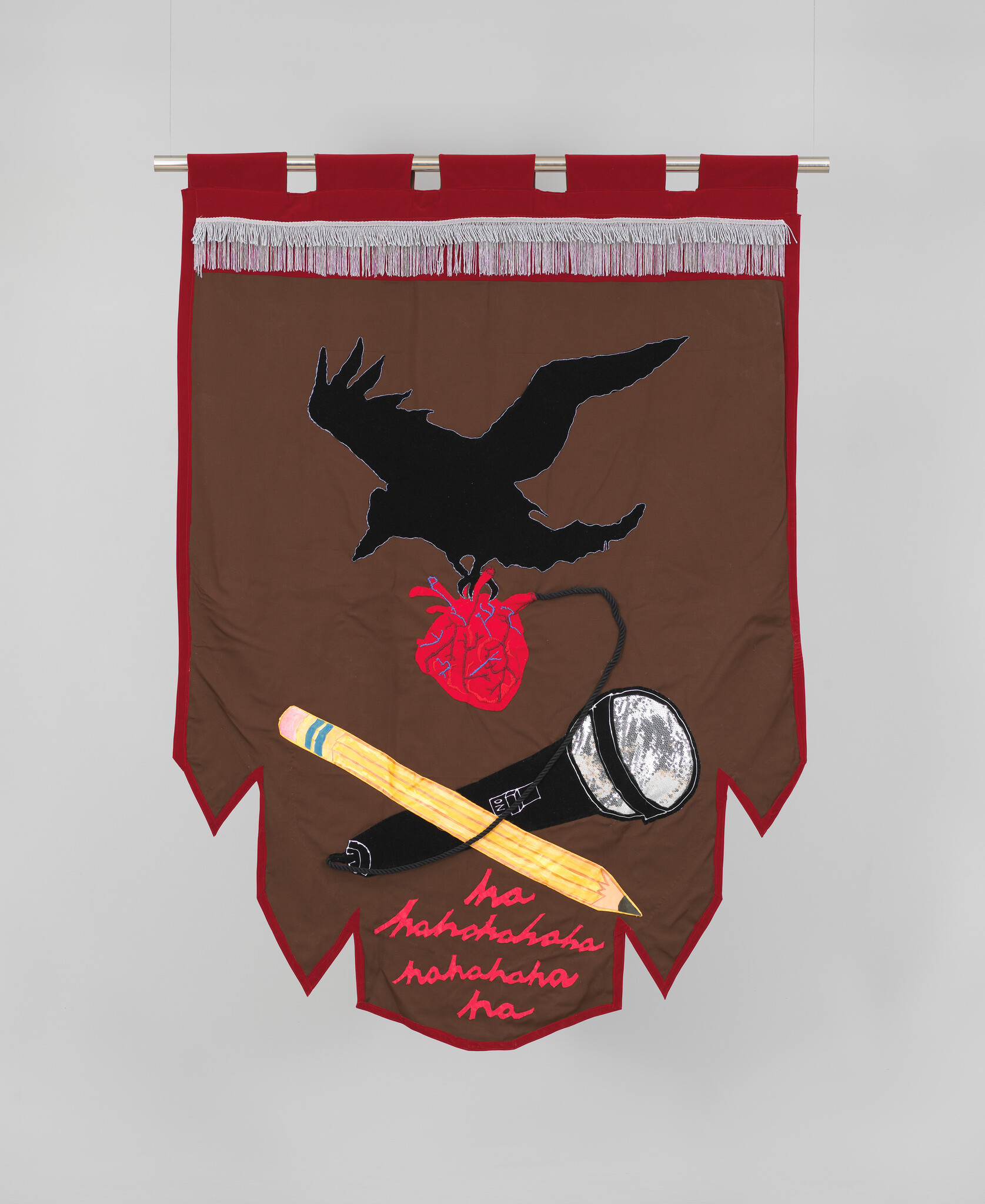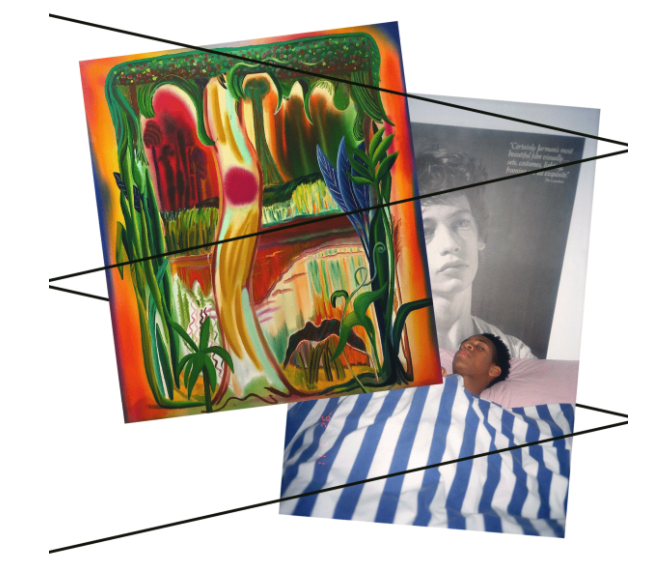Not on view
Date
2017
Classification
Textiles
Medium
Satin, poly-satin, wool felt, silk-rayon velvet, embroidery floss, metallic thread, acrylic fabric paint, satin cord, polyester fringe, poly-silk tassels, and sequins
Dimensions
Overall: 72 3/4 × 51 3/16 × 3/4 in. (184.8 × 130 × 1.9 cm)
Accession number
2018.34
Credit line
Purchase, with funds from the Painting and Sculpture Committee and the Director's Discretionary Fund
Rights and reproductions
© Cauleen Smith
Audio
-
0:00
Cauleen Smith
0:00
Cauleen Smith: Mi nombre es Cauleen Smith. Soy cineasta y artista plástica.
Narrator: En 2015, Smith bocetó los textos en el frente de estas banderolas.
Cauleen Smith: Creo que ya se había publicado el quinto o sexto video de una balacera de la policía en este país y sentí enorme indignación, enojo y agotamiento ante toda la cultura de este país.
Las frases son algo así como «no extraña que esté quebrada», o «no me escucha siquiera». Siempre encierran una acusación o bien señalan a sí mismo o a otro y, para mí el «yo» o el «tú» o el «mí» pueden cambiar y cambian, dependiendo de quién eres y cuándo lo estás leyendo.
Al reverso de cada banderola hay un sistema de símbolos, y muchos de estos se repiten. La gente me pregunta por qué me refiero, especialmente, a los lápices: para mí, el lápiz, el micrófono y el obturador de la cámara, son todos instrumentos de expresión. Son aperturas para una voz, para una iniciativa, una articulación; por tanto, el lápiz se convierte en una herramienta muy flexible que incluso puede ser un arma, puede ser leña para una hoguera. Puede ser muchas cosas diferentes, no todas afirmativas o declarativas.
En verdad creo que el arte es el único camino en este momento. No la protesta, no la política, sino el arte que quizá sea lo único que pueda generar una conversación, un diálogo, o una reconciliación, una mediación; porque la política nos ha fallado por completo. Lo que espero de mi obra es que sea capaz de llegar a las personas, a cualquiera que tenga la suficiente apertura para pensar acerca de sí mismo o del mundo, o simplemente para pensar, ni siquiera para pensar de manera diferente sino para pensar por un momento. Que la gente tan sólo contemple, que sólo se abra un poco. Si esto se logra, habré cumplido con mi propósito. La política, en realidad, se centra en la militarización, el control y el despliegue del poder, y para tener ese poder es necesario que muchos funcionen en concordancia como una sola fuerza. Para mí, eso es lo opuesto al sentido del arte.
Cauleen Smith
In Cauleen Smith (Spanish)
-
0:00
Cauleen Smith
0:00
Cauleen Smith: My name is Cauleen Smith. I'm a filmmaker and visual artist.
Narrator: Smith sketched the texts on the front of these banners in 2015.
Cauleen Smith: I think this country was on its fifth or sixth videotaped police shooting and I was just sort of incredibly disgusted and angry and fatigued by the whole culture of this country.
The phrases are either things like "no wonder I go under" or "you don't hear me though." There's always either an accusation or a pointing at self or other, and, to me, the "I" or the "you" or the "me" can shift and does shift depending on who you are when you're reading it.
On the back of each banner there's a system of symbols and a lot of them repeat. People ask me in particular about why pencils and the pencil, the microphone and the camera aperture are all to me these instruments of expression. They're apertures for a voice, for initiative, for articulation, and so the pencil becomes this very flexible tool that can even be a weapon, can be kindling for a fire. It can do a lot of different things, not all of them affirmative, or affirming.
I actually think that art might be the only thing at this point. Not protesting, and not politics, but art may be the only thing that could actually create conversation and dialogue or reconciliation or mediation. Because politics has just completely failed us. What I hope my work is capable of is for individuals, it's for just any one person. If there's just enough of an opening in them that they think about themselves or the world or just think, and not even think differently, but just think for a moment. Just contemplate. Just open up a little bit, then I've done my job. Whereas politics is really about the martialing and controlling and deployment of power, and in order to have that power you have to have a lot of people in agreement functioning as a force. To me, that's the opposite of what art does.
Cauleen Smith
-
0:00
Cauleen Smith
0:00
Cauleen Smith: Hay algo muy, muy personal en las procesiones. Al caminar por la calle mientras se hace una declaración pública, se atrae a individuos que desean saber o que se interesan, que se sienten atraídos o curiosos, acerca de lo que estás expresando o por lo que estás protestando. Es algo diferente a una manifestación política grande o a las protestas donde hay una suerte de empuje muy fuerte hacia afuera.
En verdad creo que el arte es el único camino en este momento. No la protesta, no la política, sino el arte que quizá sea lo único que pueda generar una conversación, un diálogo, o una reconciliación, una mediación; porque la política nos ha fallado por completo. Lo que espero de mi obra es que sea capaz de llegar a las personas, a cualquiera que tenga la suficiente apertura para pensar acerca de sí mismo o del mundo, o simplemente para pensar, ni siquiera para pensar de manera diferente sino para pensar por un momento. Que la gente tan sólo contemple, que sólo se abra un poco. Si esto se logra, habré cumplido con mi propósito. La política, en realidad, se centra en la militarización, el control y el despliegue del poder, y para tener ese poder es necesario que muchos funcionen en concordancia como una sola fuerza. Para mí, eso es lo opuesto al sentido del arte.
Cauleen Smith
In Whitney Biennial 2017 (Spanish)
-
0:00
Cauleen Smith, Overview
0:00
Cauleen Smith: There is something really, really personal about processions. When you walk down the street and are making a public declaration, it draws individuals to you who want to know or are concerned or are engaged or curious about what you're expressing or what you're demonstrating. That's kind of different than really large political protests or agitations where there's sort of like a very forceful push outwards.
I actually think that art might be the only thing at this point. Not protesting, and not politics, but art may be the only thing that could actually create conversation and dialogue or reconciliation or mediation. Because politics has just completely failed us. What I hope my work is capable of is for individuals, it's for just any one person. If there's just enough of an opening in them that they think about themselves or the world or just think, and not even think differently, but just think for a moment. Just contemplate. Just open up a little bit, then I've done my job. Whereas politics is really about the martialing and controlling and deployment of power, and in order to have that power you have to have a lot of people in agreement functioning as a force. To me, that's the opposite of what art does.
Cauleen Smith, Overview
-
0:00
Cauleen Smith, Overview
0:00
Cauleen Smith: My name is Cauleen Smith. I'm a filmmaker and visual artist.
Narrator: Smith sketched the texts on the front of these banners in 2015.
Cauleen Smith: I think this country was on its fifth or sixth videotaped police shooting and I was just sort of incredibly disgusted and angry and fatigued by the whole culture of this country.
The phrases are either things like "no wonder I go under" or "you don't hear me though." There's always either an accusation or a pointing at self or other, and, to me, the "I" or the "you" or the "me" can shift and does shift depending on who you are when you're reading it.
On the back of each banner there's a system of symbols and a lot of them repeat. People ask me in particular about why pencils and the pencil, the microphone and the camera aperture are all to me these instruments of expression. They're apertures for a voice, for initiative, for articulation, and so the pencil becomes this very flexible tool that can even be a weapon, can be kindling for a fire. It can do a lot of different things, not all of them affirmative, or affirming.
Narrator: Smith plans to use these banners in a film. A gospel choir will carry them down Martin Luther King Boulevard in Chicago, singing an original composition that uses text from the banners. If you’d like to hear Smith talk about processions, collective action, and the role of art, please tap to continue.
Cauleen Smith, Overview
-
0:00
Cauleen Smith
0:00
Cauleen Smith: Mi nombre es Cauleen Smith; soy cineasta y artista plástica.
Narrator: En 2015, Smith bocetó los textos en el frente de estas banderolas.
Cauleen Smith: Creo que ya se había publicado el quinto o sexto video de una balacera de la policía en este país y sentí enorme indignación, enojo y agotamiento ante toda la cultura de este país.
Las frases son algo así como «no extraña que esté quebrada», o «no me escucha siquiera». Siempre encierran una acusación o bien señalan a sí mismo o a otro y, para mí el «yo» o el «tú» o el «mí» pueden cambiar y cambian, dependiendo de quién eres y cuándo lo estás leyendo.
Al reverso de cada banderola hay un sistema de símbolos, y muchos de estos se repiten. La gente me pregunta por qué me refiero, especialmente, a los lápices: para mí, el lápiz, el micrófono y el obturador de la cámara, son todos instrumentos de expresión. Son aperturas para una voz, para una iniciativa, una articulación; por tanto, el lápiz se convierte en una herramienta muy flexible que incluso puede ser un arma, puede ser leña para una hoguera. Puede ser muchas cosas diferentes, no todas afirmativas o declarativas.
Narrator: Smith piensa usar estas banderolas en una película. Un coro de gospel las llevará por el boulevard Martin Luther King en Chicago, cantando una composición original que use el texto en las banderolas.
Cauleen Smith
In Whitney Biennial 2017 (Kids, Spanish)


